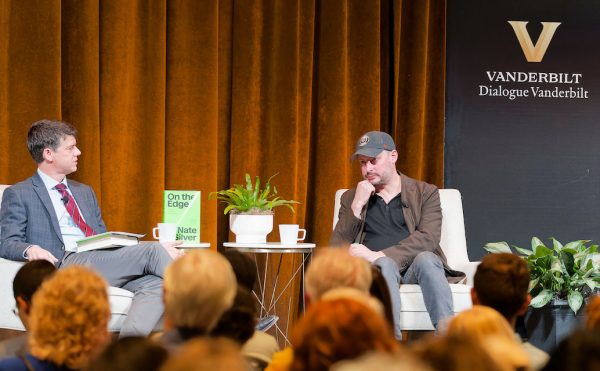
Just three days after Vanderbilt football defied the odds to upset Alabama, Dialogue Vanderbilt welcomed renowned statistician and writer Nate Silver to campus to discuss his latest book, On the Edge: The Art of Risking Everything.
Silver was introduced by Imaad Muwahid, Class of ’26, an economics and political science major who is captain of the debate team, a member of the Dialogue Vanderbilt Student Advisory Board, and a Clinton Global Initiative University Scholar.
In his introduction, Muwahid mentioned Vanderbilt’s improbable win over Alabama as well as probabilities related to sports, gambling and elections, three topics that came up throughout the evening. Professor of Political Science John Sides, who holds the William R. Kenan, Jr. chair, started and ended the evening with a discussion of gambling. Sides and Silver noted that most gambling is more loss than reward for those playing. And Silver should know. Over one NBA season, he wagered a total of $1.8 million and spent about 5,000 hours to win only $5,000.
This is just one of the topics Silver writes about in his book On the Edge. He goes behind the scenes of casinos, venture capital firms and crypto networks and into the minds of professional risk-takers to better understand navigating uncertainty in the 21st century.
During their discussion, Sides and Silver identified one particular takeaway from the book: Most people are a little too risk averse. Silver encouraged people to be smart about odds but noted that risk tolerance correlates to being open to experiences. Research has found that people feel happier when they are making changes. Change requires courage, he said, and being courageous tends to correlate with happiness.
Sides pointed out that political science research related to risk indicates that risk-accepting people tend to vote for challengers more than incumbents and to support less experienced candidates. That set the stage for a conversation about this year’s election, during which Silver said his forecasting model currently favors Kamala Harris over Donald Trump by 55 percent to 45 percent. He noted that this is still very close to the outcome of a coin flip and that it might be a very close election with a disputed result.

Harrison McClary/Vanderbilt University
Silver also acknowledged that both Trump and Harris are currently more popular than President Joe Biden, Hillary Clinton or even former President Trump in his two previous elections.
Assessing each campaign’s risk appetite this election cycle, Silver asserted Tim Walz was a risk-averse pick for a running mate but praised the Democratic Party’s switch from Biden to Harris as a risk that is paying off. With that switch, he said, Democrats more than doubled their chances of winning, from 27 to 55 percent. Silver praised Trump’s strategy of targeting microniche groups to raise his ceiling to the 49 percent of the vote that would likely mean winning the Electoral College.
He acknowledged that the uncertainty of the outcome at this point can be difficult, especially for risk-averse people. “Politics kind of breaks people’s brains a little bit, and they don’t really like uncertainty,” Silver said. But being engaged in the game—whether politics, sports or gambling—can lead to happiness that comes from being courageous enough to take risks.